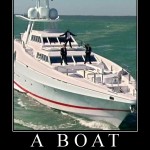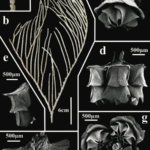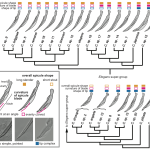If there’s one thing I learned at ScienceOnline2011 (a gathering of journalists, writers, and scientists), it’s that science communicators should tell stories, not just facts.
Us scientists sometimes have blinders on—facts are what we need, want, and crave. A ‘gut feeling’ certainly won’t pass peer review. But oftentimes it is a gut feeling that leads to those spectacular discoveries, producing the most captivating papers (or, alternatively, cool papers come from some rich dude throwing sh*tloads of money at something **coughCraigVentercough**).
My first year of contributing to Deep-sea News has been somewhat of a whirlwind (understatement of the century!!), and I realized that I haven’t yet told my story as a scientist.
I can’t pinpoint exactly what made me want to pursue a career in science. In high school, I knew I was good at debates (I liked the passion of arguments); I was thisclose to studying law, but decided to pursue biology because I was much more attached to the subject matter. I LOVED AP biology, was on the science team, and had an amazing science teacher (shout out to Mrs. Pauline Allaire-Adams!). Plus, my response to all DNA-related topics was “That’s fucking AWESOME!”. After pouring over career websites and talking to scientists, I decided in high school that I would need (and wanted) a Ph.D. if this was going to be my career. Yes, I’m that much of a planner. I’m also the different coloured post-it notes for different to-do tasks kind of person.
I applied, and was accepted to, a biology degree program at King’s College London where I would get a solid yet diverse foundation in basic biological principles.
At this point I will cue a mental montage to signify time passing from high school to Ph.D. applications: Tearful hugs at the airport, dramatic moments of staring with poignant guitar riffs in the background, and the occasional upbeat scene of group laughter with slow motion jumping at the end.
Ok, now it was time to apply for Ph.D. programs. Choosing the topic of your thesis is a very personal decision—at least, it was for me. I wanted my thesis to reflect my persona as a scientist, be a testament to my diverse skill set, and set the stage for my long-term research goals. I also didn’t want to spend years taking grad classes and doing rotations, so I had my eyes set on a Ph.D. course in the United Kingdom.
I had four requirements for my Ph.D. 1) I wanted to live in London 2) The project must involve deep-sea ecosystems (because they’re fucking AWESOME), 3) I didn’t want to work on overstudied and/or charismatic species. (I have a deep-seated hatred of vertebrates, especially dolphins), and 4) I must be trained in molecular biology.
All of this led me to a position advertised at The Natural History Museum, London, under Prof. John Lambshead. The project was going to utilize integrative methods (taxonomy AND molecular work) to investigate deep-sea nematode communities from the sub-Antarctic. Ph.D. SCORE!
Three years of hell later, I emerge newly Doctor-ious. Having visited the University of New Hampshire during my Ph.D. and knowing that UNH was at the forefront of high-throughput sequencing research on nematodes (an emerging field that is fucking AWESOME!), I worked my magic to sneak in as a postdoc.
What is the moral of this story? On the surface, any given scientist appears to be tightly pigeonholed into his or her own extremely specialized corner. It can be baffling to wonder how they ever arrived there. Ten years ago I would have laughed if someone predicted I’d be a taxonomic whiz and molecular ninja of microscopic worms. But that’s exactly where my windy path has led.






That story was fucking AWESOME! Thanks for sharing Holly. My path was even more winded and intricate, but the moral is the same. A series of events (both fortunate and unfortunate) has led me to where I am now. Never would have thought I’d be diving in subs to deep sea, describing new species, doing population genetics (or any genetics), be a scientist, or even now working out the population history of intertidal mussels, studying introgression in mussels and pitcher plants, etc. etc. etc. Oh yeah, and be a DAD (twice!), marry a beautiful swede, be really into whisky. So much of my life was unpredictable.
This is partly why I am in favor of letting kids/students experiment, fuck up and make mistakes, and then figure things out on their own. My blunders shaped my worldview more than any education and training has.
My story and interest in science dates back to childhood (awhile ago), but more recently in the mid-to-late 1990s, when I was working in the banking industry to help support my family. After a vacation to a sea lion hot spot, Monterey, CA, I developed a deep and abiding affection for sea lions, and an interest in their success along with that of other marine mammals, and how pollution, global warming and climate change, in particular will and are affecting them and their habitat. At the time, I was taking evening/online classes at my local community college to make myself more valuable to my employer. When I had the amazing good fortune to be laid off as a result of a merger, I returned to school full time to complete my education. Over the next 6 years, I earned my BS in Oceanography, and an MS in Environmental Sciences and Policy. With my classes in science and math, I found that science and math, and math in particular, is/are more fun that almost anything else. Being a non-traditional student (married with 2 teenager/young adults), and a few gray hairs, I found it difficult to get a job in my field, though I did get the opportunity to work on a few field projects. I have found that aside from math and science study, almost nothing is as fun as playing in the sand looking for juvenile Dungeness crabs, among other creepy-crawlies.
The need to make a living became an imperative, and I stumbled into a job teaching Business Math at a local community college because I knew one of the professors, who knew what I know. I have also taught a low-level Accounting course (so much fun with all those numbers!), and have now branched out to teach Environmental Science at another College. I would never have guessed that I would enjoy teaching as much as I do, though I would never say ‘no’ to another field project, or a research cruise if asked. Being at sea on a research vessel collecting data gives me a high that adrenaline/caffeine alone or in combination cannot produce.
I continue to teach full time for one institution and full to part time at another to help pay off student loans. I look forward to talking math and science to whoever comes across my path, and to my two sweet grandsons in particular. What could have been if I had known much earlier that math and science were so much fun?
I realize that I have not provided any expletives in my missive, but the only way I usually use those such words myself is to describe, as my brother does, that “all car salesmen are f***ers”! I hope that will do.
Melissa – Awesome & fascinating science story. Depending on your time flexibility, you can volunteer on UNOLS and NOAA vessels. At Scripps, CalCOFI in particular goes out 4 times per year, and often takes volunteers, especially if there is research that you can accomplish out there without wire time. http://shipsked.ucsd.edu/General_Info/Volunteer/
Whoa!! Thank you for letting me know, and for the link!
“(I have a deep-seated hatred of vertebrates, especially dolphins)”
…
You have made a not-so-powerful enemy.
I’m not really a scientist yet, or if my path will really lead me to such a title, but I hope to at least work with dolphins in some form or fashion. They’ve touched me in ways I can’t begin to describe.
I don’t know why you have a deep-seated hatred of vertebrates… I don’t have a hatred of invertebrates. Cephalopods and nudibranchs are so adorable! I also have a soft spot for polychaete worms.